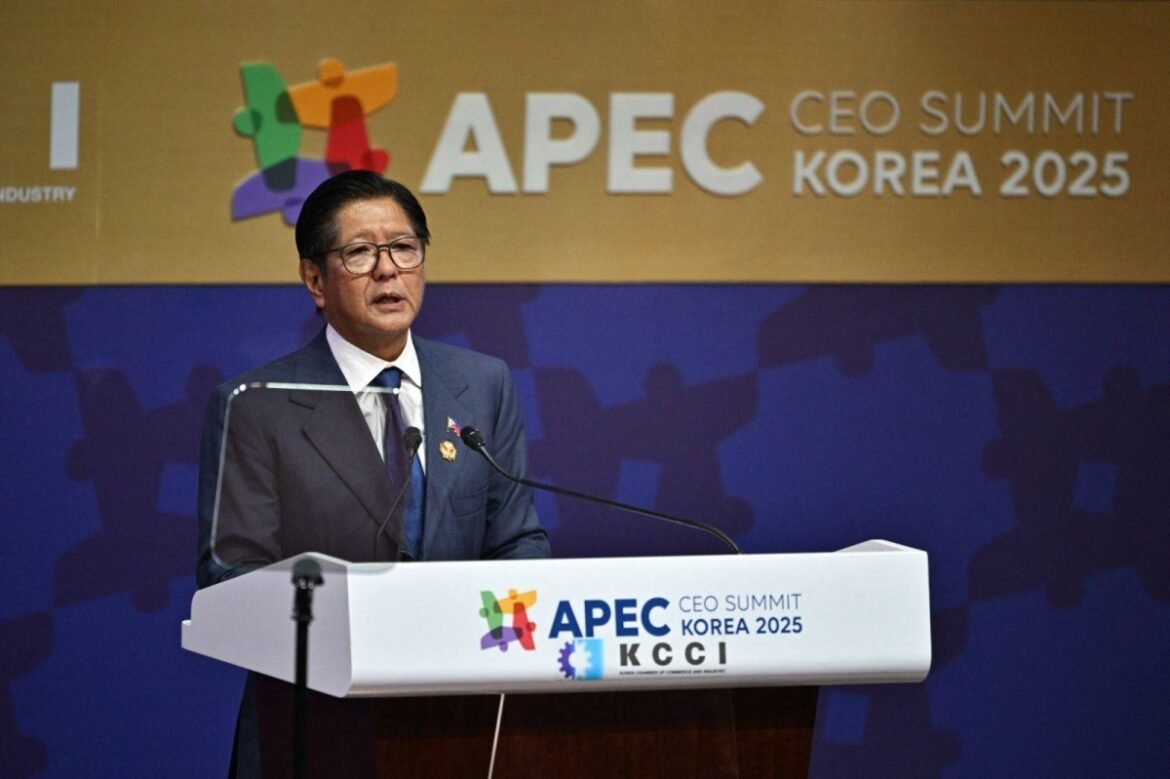(UPDATE) GYEONGJU, South Korea — President Ferdinand Marcos Jr. on Friday made a fresh pitch for global investors to look to the Philippines, highlighting sweeping reforms and digital transformation efforts designed to build “a connected, resilient and opportunity-driven Asia-Pacific.”

CEO SUMMIT Philippine President Ferdinand Marcos Jr. delivers a speech during the Asia-Pacific Economic Cooperation CEO Summit at the Gyeongju Arts Center in Gyeongju on Oct. 31, 2025. PHOTO BY ANTHONY WALLACE VIA AFP
Speaking before top executives and policymakers at the APEC Economic Leaders Meeting (AELM) here, Marcos said his administration is positioning the Philippines as an innovation-driven economy through infrastructure modernization, artificial intelligence and education reforms that prepare the workforce for the digital age.
CEO SUMMIT Philippine President Ferdinand Marcos Jr. delivers a speech during the Asia-Pacific Economic Cooperation CEO Summit at the Gyeongju Arts Center in Gyeongju on Oct. 31, 2025. PHOTO BY ANTHONY WALLACE VIA AFP
“The Philippines is open, ready and eager to do business with all of you,” he said. “We bring a dynamic workforce, a thriving innovation ecosystem, and an unwavering commitment to sustainable and inclusive prosperity.”
The president’s keynote address came as he met with fellow APEC leaders to chart the region’s economic priorities and investment course.
Marcos said digital infrastructure and connectivity are at the core of the country’s development agenda, citing government initiatives to expand broadband access to underserved areas and to equip micro, small and medium enterprises (MSMEs) with e-commerce and digital marketing skills.
“We are ensuring that no Filipino is left behind in the digital economy,” he said, noting that more than 1 million entrepreneurs have been empowered through the Digitalization of MSMEs Program.
He added that the government has strengthened data governance and cyber resilience to build trust in the country’s growing digital systems.
The president touted a slate of recent laws aimed at making the Philippines more attractive to investors, including the Create More Act, which reduces corporate income taxes and extends investment incentives for up to 40 years, and the Public-Private Partnership Code, which streamlines approvals for major projects.
He also cited Republic Acts (RAs) 12252 and 12289, which liberalize land leases and speed up government acquisition for infrastructure, and RA 12253, which sets a stable fiscal regime for large-scale mining.
“Our actions are focused on delivering deep, institutional and business-friendly reforms that unlock private capital and sustain competitiveness,” Marcos said.
Marcos used his address to preview the Philippines’ Asean chairmanship in 2026, saying Manila will lead efforts to roll out the Asean Digital Economy Framework Agreement, which is expected to unlock a $2-trillion regional digital market by 2030.
The president identified key areas in which the regional bloc could work together, beginning with restoring the World Trade Organization’s dispute settlement mechanism and Appellate Body, which he said were vital to maintaining a fair and functioning global trading system.
“Without a functioning dispute settlement mechanism, small economies would be at a disadvantage. For small economies, rules are a potent equalizer,” he said.
The Appellate Body, the final court for trade disputes, has been unable to hear appeals since late 2019 due to a lack of a quorum of members, a situation caused by the blocking of new appointments.
He urged member states to develop “new and forward-looking disciplines” to strengthen trade in the digital era and create a more enabling environment for small and medium enterprises.
“To advance our sustainability agenda and food security, let us prioritize negotiations in agriculture, and move forward the second wave of negotiations of the Fisheries Subsidies Agreement. These will help ensure that trade remains a force for sustainability and shared progress,” he said.
To further strengthen regional connectivity, Marcos emphasized the importance of building smarter and more sustainable supply chains through regulatory reforms, digitalization and skills development.
“Ultimately, APEC’s enduring strength lies in its capacity to bridge differences, build capacities and foster trust,” he said.
The president stressed that the Philippines is prepared to work with all APEC economies and partners to uphold an open, connected and future-ready region to maintain resiliency and attain shared prosperity.
“As we confront the defining challenges of our time, from climate change and demographic shifts to emerging health and security risks, it is clear that resilience and sustained growth depend on an essential ingredient: strong public-private collaboration. APEC’s strength and relevance lie in its strong ties with business and stakeholders,” Marcos said.
In Manila, Malacañang said on Friday that the president’s participation in this year’s APEC Leaders’ Meeting not only reaffirms the nation’s strengthening ties with global partners, but also its commitment to APEC’s vision of a more open, prosperous and dynamic Asia-Pacific.
This year’s summit has the theme “Building a Sustainable Tomorrow: Connect, Innovate, Prosper,” which aligns with the goals of the APEC Putrajaya Vision 2024 for an open, resilient and peaceful Asia-Pacific.
As the largest economic cooperation forum in the Asia-Pacific, the AELM brings together leaders from 21 member economies that represent about 61 percent of global gross domestic product and half of world trade.
South Korea’s hosting of APEC 2025 marks 20 years since it last hosted in Busan in 2005. It focuses on addressing shared challenges, embracing digital innovation and prioritizing inclusive growth.
Marcos arrived in South Korea on Thursday for the two-day summit, where he is also scheduled to meet with top business leaders and the Filipino community.


